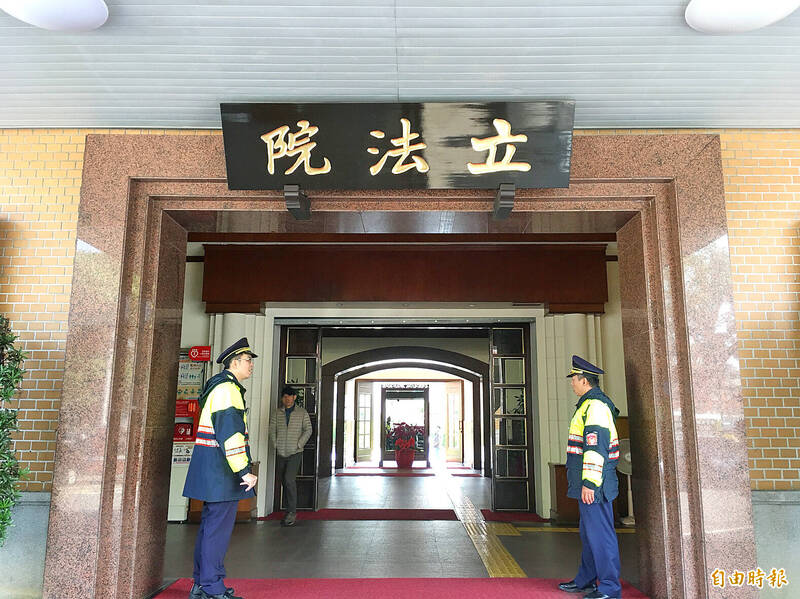《TAIPEI TIMES》 Legislator plans bill after Zhuhai air show incident

Police officers guard an entrance to the Legislative Yuan in Taipei in an undated photograph. Photo: Lin Liang-sheng, Taipei Times
CLOSING LOOPHOLES: Without tightening laws, more former military officers could be recruited to speak out in support of China, lawmakers said
By Chen Cheng-yu and William Hetherington / Staff reporter, with staff writer
Democratic Progressive Party (DPP) Legislator Chiu Chih-wei (邱志偉) has proposed an amendment that would punish military personnel ranked lieutenant commander and higher who participate in pro-China activities, after a former navy lieutenant praised China at an air show.
At the opening of the China International Aviation and Aerospace Exhibition in Zhuhai, China, on Tuesday, former navy lieutenant commander Lu Li-shih (呂禮詩) said in an interview with Chinese media that the expo demonstrated that “our China” has become powerful.
The Chinese Communist Party (CCP) uses the annual air show to showcase the military’s latest weapons and other equipment.
“I want to share this valuable experience of attending the air show, and tell everyone the truth about China. I want to let Taiwanese know how strong our China is,” Lu said.
The interview was broadcast by major state-media outlets in China, leading analysts in Taiwan to speculate that it was planned as a propaganda piece by the CCP. Some commented online that such pro-China statements by retired military personnel would affect arms sales to Taiwan by the US and other countries.
As the Act Governing Relations Between the People of the Taiwan Area and the Mainland Area (臺灣地區與大陸地區人民關係條例) only stipulate rules against such acts for retired generals, Lu’s pension cannot be suspended nor his awards revoked.
Under the proposed amendment to the act, former government or military personnel who participate in activities hosted by the CCP could be deprived of their monthly pension, Chiu said on Saturday.
The amendment is aimed at “tackling loopholes in laws and regulations that allow foreign forces to recruit retired Taiwanese military personnel” for seditious acts, he added.
Article 9-3 of the act states that nobody who held the rank of major general or higher can “participate in any ceremony or activity held” in China that “harms the national dignity.”
Chinese Nationalist Party (KMT) Legislator Weng Hsiao-ling (翁曉玲) has proposed deleting the article, saying that it “violates the freedom of speech and expression laid out in the Constitution.”
Chiu said the National Defense Act (國防法) stipulates that anyone who serves in the military, regardless of rank, has a duty of loyalty to the country.
“In countries around the world, veterans who contravene their duty of loyalty to the country would be punished and deprived of retirement benefits,” he said. “In Taiwan, this is especially important since it is a target for Chinese infiltration.”
DPP Legislator Hung Sun-han (洪申翰) expressed support for the amendment, saying that Lu’s ability to make such statements with impunity demonstrated that the CCP would take advantage of loopholes in Taiwan’s laws.
“In the future, such incidents are likely to increase in number unless Taiwan amends its laws,” he said.
Separately, DPP Legislator Chen Kuan-ting (陳冠廷) said that laws are too lenient in punishing acts of sedition.
The average sentence in sedition cases tried between 2016 and last year was only six months, he said.
“Even if the evidence in such a case is conclusive, the final result is a light sentence or even just a fine. This emboldens communist spies and is detrimental to national security,” he said.
Chen proposed amendments to the National Security Act (國家安全法), the Anti-infiltration Act (反滲透法) and the Classified National Security Information Protection Act (國家機密保護法).
The government should establish a professional national security court, at which cases would be handled by judges trained to handle national security issues, he said.
新聞來源:TAIPEI TIMES















